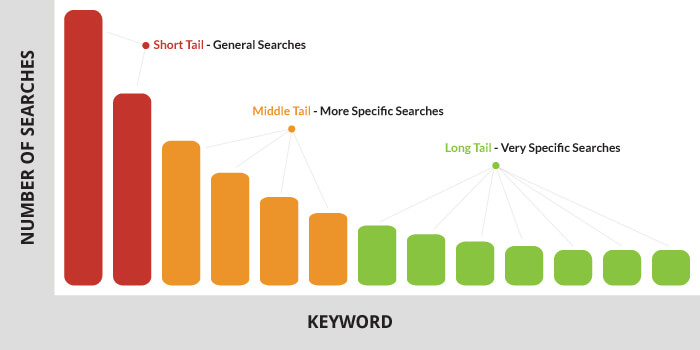Keywords are the very base of an SEO campaign. Whether its paid or unpaid, if your keywords aren't effective, the whole purpose of your campaign is lost. However, when it comes to ineffective keywords, paid marketing takes the hardest hit. When you run Pay-per-Click (PPC) campaign, you pay for each click that a user makes on your ad. How many people actually convert into paying customers is irrelevant, but you pay for every click. Hence, it is very important that your ad is displayed for the right search query; and search queries are all about keywords. To run an effective PPC campaign, it's very important that you bet on the right keywords. Here are 5 major bloopers that people make when it comes to choosing the right keywords.
1. Fat heads (keywords) only
One of the biggest bloopers you can make is concentrating only on fat head keywords. Fat head keywords general and broad terms like ‘shirts’ or ‘glass’. These are the most commonly searched terms and are very high volume. But, the greater the volume, more the competition. These terms are very hard to rank on and are very costly bids. Only concentrating on fat head keywords because they have a high search volume would be really a foolish thing to do because not only are they really expensive they are also really vague. Like for eg. If you are selling only men’s formal shirts, and someone is looking for women’s shirts, he’ll still land on your ad. If he clicks on it and is redirected to the site, he is definitely not going to buy. So you still pay for the click but don’t make a sale in return. That means more spending, no earning. Instead, concentrate on long-tail keywords like ‘men’s shirts’ or ‘formal shirts’. They have relatively high search volume, are less expensive and most importantly, are relevant to your business.
2. The common long-tails (keywords)
If you are running a PPC campaign in Google Adwords, then there are a bunch of long-tail keywords that it suggests, which is pretty convenient. The problem, it suggests the same keywords for your competitors too. So how do you gain that edge over your competition? The answer is 'human logic'. While Google suggestions are very useful, they lack a human logic. For eg. If one is looking for wedding cakes then it's possible they are planning their planning their own wedding and need a wedding planner. If you are a wedding planner, then besides just bidding on 'wedding planner' related keywords you could also bid on 'wedding cake', 'wedding decorator' and other wedding related search queries. That way, you will be visible to people who might need your services but aren't actively looking for them. [caption id="attachment_139" align="aligncenter" width="700"] The type of keyword selected is very important[/caption]
The type of keyword selected is very important[/caption]
3. Negative keywords? Eh?
Negative keywords are one of the most important things to optimize your PPC campaign, they can save you a whole lot of money. What are negative keywords? Well, negative keywords are the keywords that are not relevant to you. Like for example, you are in the business of selling glass sheets. In that case, people searching for 'wine glass' are irrelevant to you. To avoid your ad being displayed in those search results, you can add terms like 'wine glass', 'glass animals', 'glass eye' etc. to your negative keyword list. That way you will avoid a lot of irrelevant clicks and save money. [caption id="attachment_134" align="aligncenter" width="304"] Negative Keywords can be used to optimize your PPC Campaign[/caption]
Negative Keywords can be used to optimize your PPC Campaign[/caption]
4. What do you mean types of matches?
Before you start narrowing down key words and creating ads, you'll want to comprehend the three forms of keywords in Google Ads. Selecting different keyword types will lead to changes in the price of your ads and click through rate. There are three types of keyword matches:
a. Broad match: If a keyword set to 'broad match', your ad will be displayed when the search query contains any combination of the words in your keyword in any order, as well as other forms of the words, such as singular/plural forms, synonyms, etc. like, if you use the broad match keyword type for "black shoes", then your ad could come up in searches for 'black women's shoes', 'mid heel black shoes', 'loafers' etc.
b. Phrase match: If you select the 'phrase match' keyword type, then your ad will be displayed when the search query contains the same order of the words, but can also contain other additional words. For example, choosing the phrase match keyword type for "black shoes", your ad could appear in a search query like "Black loafer shoes"
c. Exact match: As obvious as it is, an 'exact match' keyword will display your ad only if the search query is exactly as your keyword, the exact words in exact order.
5. Spend it all!
A PPC campaign needs quite a lot of money. It becomes very important that you optimize your PPC budget. Analyze the keywords that are doing best, both in terms of the no. of clicks and the conversions and assign more budget to those. Close down the keywords that are not doing too well. But most importantly, keep refreshing your keyword list to gain new audience.














